|
|
|
Sort Order |
|
|
|
Items / Page
|
|
|
|
|
|
|
| Srl | Item |
| 1 |
ID:
132326
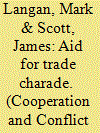

|
|
|
|
|
| Publication |
2014.
|
| Summary/Abstract |
Aid for Trade (AfT) has gained prominence as an innovative form of donor support in the 'post'-Washington Consensus. AfT mechanisms have been praised as a means of aligning trade liberalisation deals (whether in the Doha Round or within bilaterals) to poverty reduction objectives. This article, through critical analysis of AfT discourse within the 'moral economies' of multilateral World Trade Organization and bilateral European Union-African, Caribbean and Pacific negotiations, points to the strategic purposes of donor language in rationalising asymmetric North-South trade systems. Moreover, it questions the 'development' credentials of AfT assistance by examining some of the ensuing private sector activities and the impact on the supposed beneficiaries, and the tying of AfT disbursements to the implementation of inappropriate policies.
|
|
|
|
|
|
|
|
|
|
|
|
|
|
|
|
| 2 |
ID:
124204
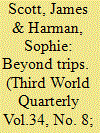

|
|
|
|
|
| Publication |
2013.
|
| Summary/Abstract |
The current round of World Trade Organization (WTO) negotiations-the Doha Round-has significant implications for global health which have received insufficient attention from the global health community. All too often the health implications of global trade agreements are examined only after their conclusion, and are concerned only with intellectual property rights. This paper seeks to move beyond this narrow focus and elucidate the wider health implications of the Doha Round. It explores the negative effect of the Round on state capacity to provide and regulate health services in low-income countries, and the impact it will have on livelihoods among the poor and their ability to access health services. Overall the paper makes the case for greater engagement from the health community with the wto and the Doha Round negotiations beyond the customary focus on intellectual property rights.
|
|
|
|
|
|
|
|
|
|
|
|
|
|
|
|
| 3 |
ID:
155481
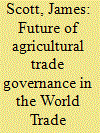

|
|
|
|
|
| Summary/Abstract |
liberalization in agriculture to broader deals involving multiple sectors through the principle of the single undertaking, but the World Trade Organization's (WTO) Nairobi ministerial conference of 2015 has abandoned that principle, shifting the multilateral trade system onto a new trajectory. Using the broad body of political economy theory, this article argues that there is now very little prospect that the WTO will be able to liberalize agricultural trade, with the consequence that the WTO will be unable to expand the trade opportunities of those countries that specialize in producing agricultural commodities. For this reason, the multilateral trade system looks increasingly ill-suited to the commercial needs of those low-income countries that are reliant on exporting agricultural goods and the promise of development through expanding trade based on comparative advantage is being tacitly pushed aside. This article argues that the abandonment of the single undertaking demands a deep reflection by WTO member states and other stakeholders on the underlying principles of the WTO, its future direction and how trade opportunities will be created for all within a system that has effectively abandoned further liberalization within agriculture.
|
|
|
|
|
|
|
|
|
|
|
|
|
|
|
|
| 4 |
ID:
150585
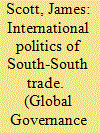

|
|
|
|
|
| Summary/Abstract |
South-South trade has become a core component of the contemporary trade debate, but the idea of using preferential trade agreements among developing countries to foster industrialization and diminish dependence on the North has a long history. This article examines the North-South and South-South politics surrounding two efforts to operationalize this idea—the Protocol Relating to Trade Negotiations Among Developing Countries in the General Agreement on Tariffs and Trade and the Global System of Trade Preferences Among Developing Countries within the UN Conference on Trade and Development. It argues that the rich world has been somewhat obstructive in these efforts, but ultimately the primary cause for the weakness of these agreements is traced to failure by the Global South to make good on the rhetoric surrounding economic cooperation and South-South solidarity. Lessons from this history must be learned if current efforts to extend the GSTP are to bring greater benefits, particularly to the least developed.
|
|
|
|
|
|
|
|
|
|
|
|
|
|
|
|
| 5 |
ID:
106641
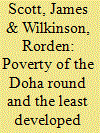

|
|
|
|
|
| Publication |
2011.
|
| Summary/Abstract |
Two distinct literatures have emerged on the World Trade Organization's Doha Development Agenda (DDA) and its likely benefits for developing countries. One is built on the use of computable general and partial equilibrium simulations, while another explores the political economy of the negotiation process to explore the opportunities a concluded round will bring for developing countries. Both literatures generate important insights into the DDA, and both highlight that the deal on offer to developing countries is very weak. However, there has been little engagement between these two bodies of thought. This paper seeks to begin to redress this, fusing a review of the simulations of likely DDA gains with an examination of the passage of the Doha negotiations. It argues that through this process we can arrive at a fuller understanding of how limited, and problematic, the results of the DDA are likely to be for the less developed countries. If the DDA is to deliver on its mandate, a qualitative shift in the negotiations is required.
|
|
|
|
|
|
|
|
|
|
|
|
|
|
|
|
| 6 |
ID:
135056
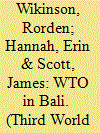

|
|
|
|
|
| Summary/Abstract |
The conclusion of the World Trade Organization’s (wto) ninth ministerial meeting – held in Bali 3–7 December 2013 – is at one and the same time momentous, marginal and business-as-usual. It is momentous because it marks the first multilateral agreement reached in the wto since the organisation began operations on 1 January 1995; it is marginal because the deal reached will have only a limited impact on the global trading system; and it is business as usual because the Bali package will be of disproportionally greater value to the industrial states than to their developing and least developed counterparts. We examine what happened in Bali, covering the principal issues at stake and the content of the outcome, what this means for the wto and for the Doha Development Agenda (dda), and why it all matters. We argue that, while the Bali ministerial is significant and the agreements reached important, the conclusion of the meeting and the package agreed represent only a limited movement forward in addressing the fundamental problems and inequities of the wto system.
|
|
|
|
|
|
|
|
|
|
|
|
|
|
|
|
|
|
|
|
|